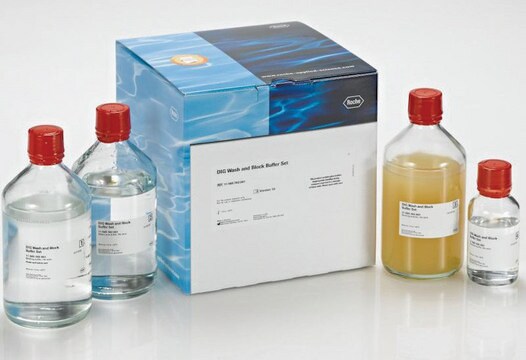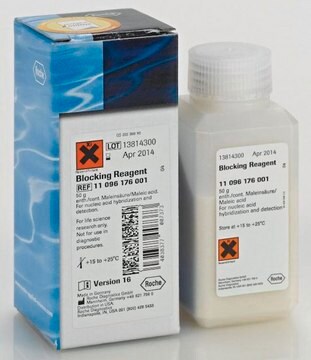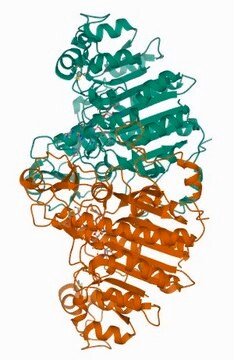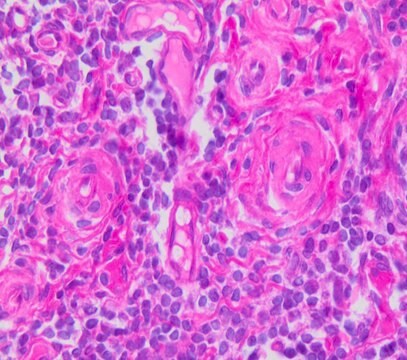PF092
Fas Ligand Plus, Human, Recombinant
Fas Ligand Plus, Human, Recombinant, consists of amino acids 103-281 fused to a 26-amino acid linker and FLAG®-tag at the N-terminus and expressed in HEK293 cells.
Autenticatiper visualizzare i prezzi riservati alla tua organizzazione & contrattuali
About This Item
Codice UNSPSC:
12352202
NACRES:
NA.77
Prodotti consigliati
Ricombinante
expressed in HEK 293 cells
Livello qualitativo
Saggio
≥95% (SDS-PAGE)
Stato
lyophilized
Produttore/marchio commerciale
Calbiochem®
Condizioni di stoccaggio
OK to freeze
avoid repeated freeze/thaw cycles
Condizioni di spedizione
wet ice
Temperatura di conservazione
−20°C
Descrizione generale
Recombinant, human Fas ligand (amino acids 103-281) fused to a 26-amino acid linker and FLAG®-tag at the N-terminus and expressed in HEK293 cells. Glycosylation of recombinant human sFasL is similar or identical to natural human FasL. The molecular weight is ~32 kDa (nonglycosylated) and ~37-42 kDa (glycosylated) by SDS-PAGE under reducing conditions. The recombinant protein is produced in HEK293 cells. It does not require enhancer for activity. Useful for cytotoxicity assays.
Fas Ligand (FasL/APO-1L/CD95L) is a ~37-42 kDa type II transmembrane protein belonging to the TNF family. Interaction between FasL and Fas induces apoptosis of Fas-sensitive cells. FasL is implicated in CTL-mediated-killing, activation-induced cell death, creation of immune-privileged sites and tissue homeostasis. The extracellular domain of human FasL can be cleaved off by a metalloprotease, generating soluble FasL (sFasL). Circulating sFasL can be detected in serum of patients with melanoma and certain types of lymphoma.
Fas Ligand (FasL/APO-1L/CD95L) is a ~37-42 kDa type II transmembrane protein belonging to the TNF family. Interaction between FasL and Fas induces apoptosis of Fas-sensitive cells. FasL is implicated in CTL-mediated-killing, activation-induced cell death, creation of immune-privileged sites and tissue homeostasis. The extracellular domain of human FasL can be cleaved off by a metalloprotease, generating soluble FasL (sFasL). Circulating sFasL can be detected in serum of patients with melanoma and certain types of lymphoma.
Azioni biochim/fisiol
≥1 ng/ml kills Fas-sensitive cells
Attenzione
Toxicity: Standard Handling (A)
Stato fisico
Lyophilized from PBS.
Ricostituzione
Following reconstitution, aliquot and freeze (-20°C). Stock solutions are stable for up to 3 months at -20°C.
Reconstitute in 50 µl PBS to yield a final stock concentration of 100 µg/ml. Further dilute in culture medium with 5% FCS immediately prior to use.
Altre note
Ashkenazi, A., and Dixit, V.M. 1998. Science281, 1305.
Nagata, S., 1997 Cell88, 355.
Hahne, M., et al. 1996. Science274, 1363.
Bellgrau, D., et al. 1995. Nature377, 630.
Lowin, B., et al. 1994. Nature370, 650.
Russell, J.H., et al. 1993. Proc. Natl. Acad. Sci. USA90, 4409.
Nagata, S., 1997 Cell88, 355.
Hahne, M., et al. 1996. Science274, 1363.
Bellgrau, D., et al. 1995. Nature377, 630.
Lowin, B., et al. 1994. Nature370, 650.
Russell, J.H., et al. 1993. Proc. Natl. Acad. Sci. USA90, 4409.
Glycosylation of recombinant human sFasL is similar or identical to natural human FasL. The molecular weight is ~32 kDa (nonglycosylated) and ~35 kDa (glycosylated) by SDS-PAGE under reducing conditions. The recombinant protein is produced in HEK293 cells. It does not require enhancer for activity.
Note legali
CALBIOCHEM is a registered trademark of Merck KGaA, Darmstadt, Germany
FLAG is a registered trademark of Merck KGaA, Darmstadt, Germany
Codice della classe di stoccaggio
11 - Combustible Solids
Classe di pericolosità dell'acqua (WGK)
WGK 1
Punto d’infiammabilità (°F)
Not applicable
Punto d’infiammabilità (°C)
Not applicable
Certificati d'analisi (COA)
Cerca il Certificati d'analisi (COA) digitando il numero di lotto/batch corrispondente. I numeri di lotto o di batch sono stampati sull'etichetta dei prodotti dopo la parola ‘Lotto’ o ‘Batch’.
Possiedi già questo prodotto?
I documenti relativi ai prodotti acquistati recentemente sono disponibili nell’Archivio dei documenti.
Il team dei nostri ricercatori vanta grande esperienza in tutte le aree della ricerca quali Life Science, scienza dei materiali, sintesi chimica, cromatografia, discipline analitiche, ecc..
Contatta l'Assistenza Tecnica.








